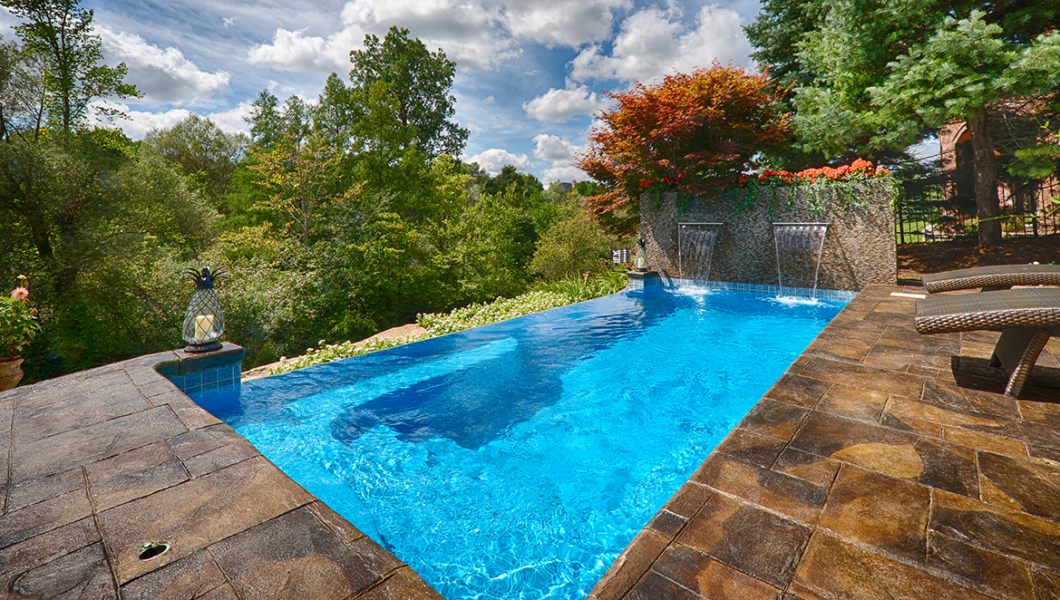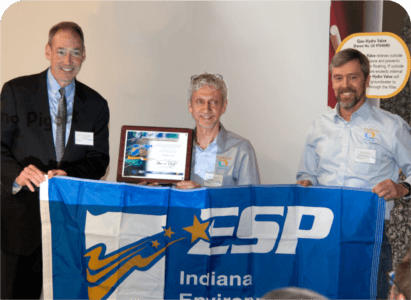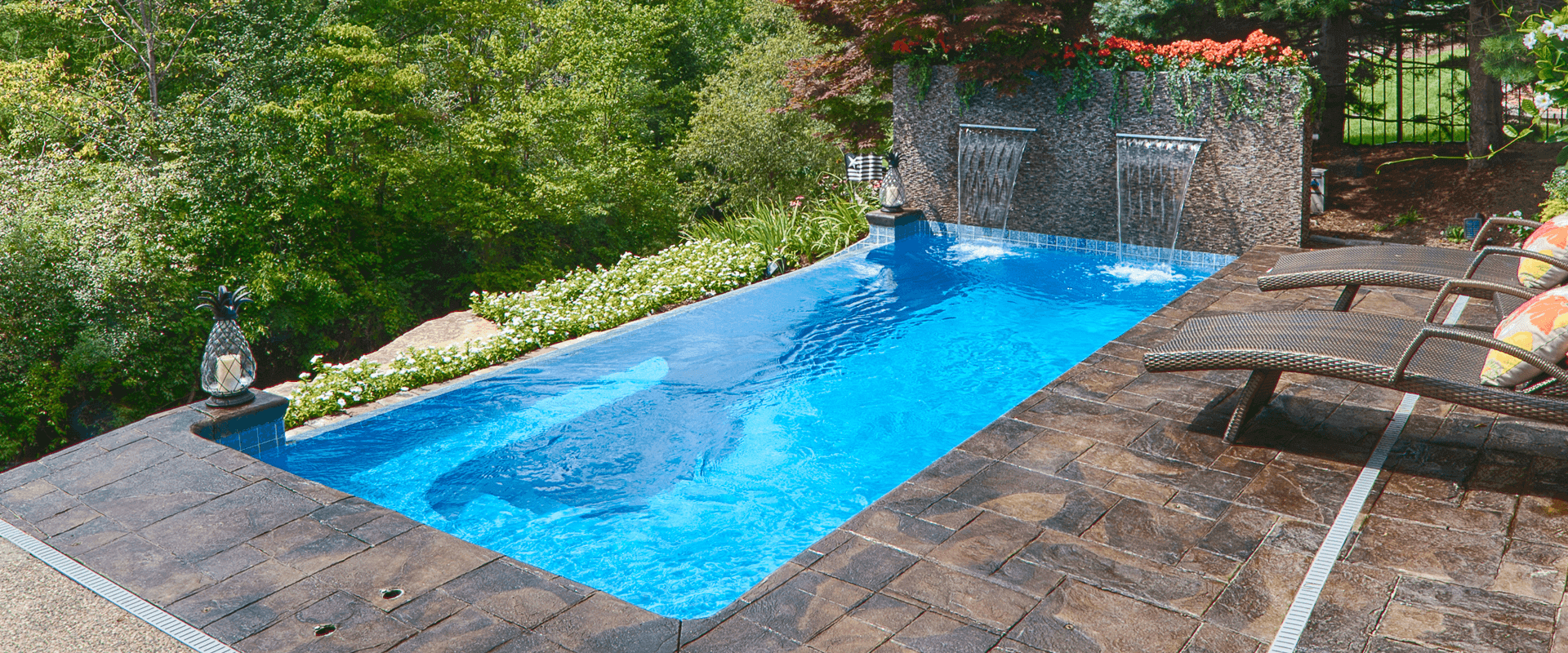877-929-7665
Environmentally Friendly Pools: Why Fiberglass Leaves Behind the Smallest Footprint

Today, pool buyers are increasingly more eco-conscious and ask questions like, “Can a pool be environmentally friendly?” and “What is the most eco-friendly pool type?” Traditionally, swimming pools have not been very sustainable. However, advancements have made it possible to reduce their environmental impact. Still, some types of inground pools have a greater environmental impact than others. Fiberglass pools are often considered the most environmentally friendly pools for their long-term durability and lower energy and chemical use. Even the manufacturer can make a difference.
The Role of Long-Term Durability
The long-term durability of fiberglass pools makes them more sustainable by significantly reducing the need for repairs and replacements, which have considerable environmental consequences. Vinyl liners, for example, typically require replacement every five to ten years, contributing to landfill waste. Additionally, vinyl-liner pools’ foundational steel panels can rust and leach chemicals into the groundwater, harming the environment. Gunite pools reinforced with steel mesh or rebar also present risks as they can corrode over time, leaching chemicals and rust. Maintaining gunite pools requires acid washing, which can also release hazardous substances into the ecosystem.
Concrete and vinyl-liner pools also have inherent environmental drawbacks due to the high carbon footprint of cement production and the petrochemical use in vinyl-liner manufacturing, contributing to greenhouse gas emissions and resource depletion. Fiberglass pools’ durable, seamless shells do not require resurfacing or frequent repairs. They don’t contain metals that rust or leach harmful chemicals and have a much lower environmental impact throughout their lifecycle.
Chemical Use and the Saltwater Consideration
Is it possible to have a chemical-free pool? The answer is, unfortunately, no. All pool types require chemicals to keep water healthy and safe for swimmers throughout the pool’s life, and these chemicals inevitably end up back in the environment. However, fiberglass pools typically require less chemical usage than other types. So, while you can’t avoid chemicals entirely and have a chemical-free swimming pool, you can lessen your usage by investing in a pool type that requires fewer chemicals overall.
What about saltwater systems? It’s a common misconception that saltwater pools (pools that use a salt generator) are a means to avoid chlorine and, therefore, would be a no-chemical option. However, salt generators convert the salt into chlorine to keep the pool clean. While there is less chlorine than a traditional chlorine system, chlorine is still present with this option, so we can’t consider it chemical-free.
Lower Energy and Water Usage
Significant energy is required to power heaters, which are essential in many regions, especially in cooler climates where maintaining a comfortable water temperature is necessary. However, fiberglass pools are naturally more energy-efficient than other pool types due to their insulating properties. The material helps retain heat more effectively, reducing the need for prolonged use of heaters. This energy conservation is particularly beneficial for minimizing emissions using traditional electric or gas heaters.
Filling a swimming pool requires substantial water, which can strain local water supplies, particularly in areas prone to drought or water shortages. Fiberglass pools have a lower evaporation rate due to their smooth, non-porous surface and natural insulation, which helps maintain a stable water temperature. Fiberglass pools also conserve water by maintaining a steady water level year-round. Unlike other pool types that may need partial or complete draining to protect the structure during freezing temperatures, fiberglass pools keep water at the skimmer level for winterization.
The Eco-Conscious Manufacturer Difference
Choosing from a manufacturer with environmental certifications, such as ISO 14001, can help you make a more eco-friendly pool choice. ISO 14001 is the international standard specifying requirements for businesses to create an effective environmental management system (EMS). Companies can use this framework to develop the best environmental stewardship practices.
As an eco-conscious manufacturer, Thursday Pools maintains ISO 14001 certification and has implemented the following measures:
Thursday Pools sources the finest and most environmentally friendly raw materials. We have partnered with Owens Corning and exclusively use Advantex® E-CR fiberglass, known for its eco-friendly properties. Produced in North America, this fiberglass is Boron-free, contributing to a lower environmental impact. Furthermore, fiberglass manufacturing and shipping of Advantex® E-CR fiberglass require less energy than traditional fiberglass materials, making it a more sustainable choice overall.
We actively collaborate with the Environmental Protection Agency (EPA) and the Indiana Department of Environmental Management (IDEM) to uphold a Title V air permit that minimizes environmental impact. As part of this commitment, Thursday Pools uses only Low HAP (Hazardous Air Pollutants) gel coats and resins in our manufacturing processes, significantly reducing the emission of harmful substances. Additionally, we employ Low VOC (Volatile Organic Compounds) release agents and solvents to limit environmental exposure further. Thursday Pools uses advanced control equipment to eliminate the generation of all PM (Particulate Matter).
Our Minimal Waste Program at Thursday Pools emphasizes sustainable manufacturing practices to minimize the generation of particulate matter (PM) and VOCs. We exclusively use non-atomizing resin spray, which significantly reduces emissions and waste. We also keep all equipment pumps operating at low pressure to limit VOC release further. Additionally, we apply solvents and release agents using HVLP (High Volume, Low Pressure) spray guns to significantly reduce overspray, resulting in lower emissions of VOCs.
Our Recycling Program at Thursday Pools is a company-wide initiative to reduce waste and promote environmental responsibility. As part of this program, we recycle various types of production waste, including light bulbs and batteries, ensuring these materials are properly disposed of and reused whenever possible.
Thursday Pools focuses on commitment to continuous improvement through our environmental and workplace practices. This dedication involves continually reviewing and measuring both current and future processes to assess and mitigate their environmental impact. We proactively seek ways to reduce our environmental footprint, striving to implement new and improved methods that promote sustainability. Additionally, we prioritize creating a safer and healthier work environment for our employees so that our commitment to continuous improvement benefits our team and the planet.
Choose the More Environmentally Friendly Pool
When purchasing sustainable products is important to you, making an informed decision about the materials and manufacturers you choose becomes even more critical. Thursday Pools is passionate about combining innovative design with environmental stewardship to make your pool investment a source of joy and a choice you can feel good about for years to come. Consult a dealer to explore how you can bring your vision to life with a fiberglass pool that leaves the smallest footprint possible.
